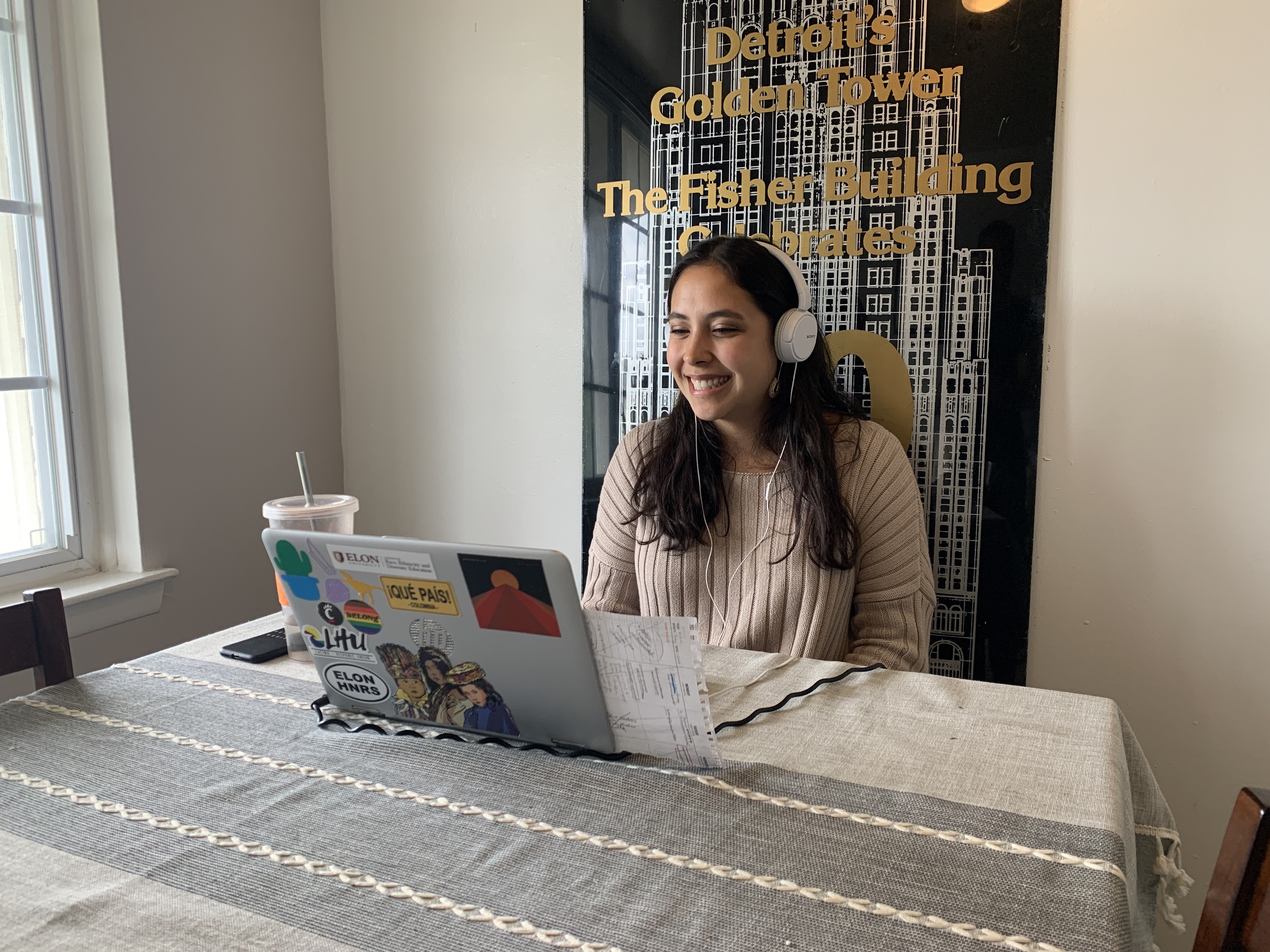As a result of the COVID-19 pandemic, students conducting research as a part of Elon’s Summer Undergraduate Research Experience (SURE) program shared their work with the Elon community virtually on Wednesday.
After working closely with a faculty mentor on a chosen research topic, students in Elon’s 2020 Summer Undergraduate Research Experience (SURE) program presented to the campus community about their work during the past eight weeks.
For the first time, however, the SURE poster session was hosted completely online.
Students in this year’s program were required to conduct research and craft their presentations virtually as a result of the COVID-19 global pandemic. On Wednesday, students grouped into several WebEx video conferencing rooms shared their findings and lessons learned from the experience.
 For Lucia Lozano Robledo ’21, an international studies and French double major and Honors Fellow from Bogotá, Colombia, adapting meant changing the way she conducted research, titled “Latinx migrants and political consciousness in Alamance County.” Lozano Robledo, whose faculty mentor is Associate Professor of History Michael Matthews, is focusing on an analysis of Alamance County’s Latinx migrant community and how its members’ identities and beliefs have changed over time. Lozano Robledo conducted most of the research for this project through participant interviews, which were made more difficult by COVID-19 and physical distancing measures.
For Lucia Lozano Robledo ’21, an international studies and French double major and Honors Fellow from Bogotá, Colombia, adapting meant changing the way she conducted research, titled “Latinx migrants and political consciousness in Alamance County.” Lozano Robledo, whose faculty mentor is Associate Professor of History Michael Matthews, is focusing on an analysis of Alamance County’s Latinx migrant community and how its members’ identities and beliefs have changed over time. Lozano Robledo conducted most of the research for this project through participant interviews, which were made more difficult by COVID-19 and physical distancing measures.
“This summer I was planning on conducting in-person interviews throughout Alamance County, so working remotely meant I had to adapt to virtual interviewing,” Lozano Robledo said. “It was challenging at first to contact participants in the midst of such difficult global circumstances, but I am glad that I was able to get in contact with enough to carry on with the project.”
Lozano Robledo was one of 37 undergraduate researchers to participate in SURE this summer. SURE is meant to enhance learning opportunities for students while encouraging collaboration in learning and research between faculty and students. The program awards participating students and faculty stipends while they work full-time during the eight-week summer intensive to conduct research.
Kevin Scott ’21, a biochemistry major from Burlington, North Carolina, used the eight weeks to continue his research on the molecular relationship between a high-salt diet and HER2 positive gastric cancer. Focusing on high rates of gastric cancer in eastern Asian countries, Scott’s research investigates how, at the protein level, a high-salt diet could lead to gastric cancer. Specifically, Scott researches the Salt Inducible Kinase 3 (SIK3) protein to find out if it is indirectly activated by the HER2 protein in gastric cancer cells. Scott says the virtual SURE experience allowed him to approach this research from a new angle.

“Since I couldn’t do research in my lab, I spent the summer working on a review paper,” said Scott, who plans to submit the paper, which he wrote with mentor and Associate Professor of Biology Yuko Miyamoto, to undergraduate scientific research journals for publication. “In the last couple of weeks, I’ve been able to go back into my research lab and start up my experiments again, but now with a better understanding of my research topic as a whole.”
Scott and Lozano Robledo are just two examples of the students who found new ways to conduct and enhance their research, despite obstacles presented by the global pandemic. Professor of Psychology and Director of Undergraduate Research Meredith Allison said it was exciting to see students present their work virtually, after a summer of adaptation.
“This summer was a challenge for students and mentors alike – how to do research when we are away from each other and our research spaces,” said Meredith Allison, professor of psychology and director of undergraduate research. “SURE students and faculty did a great job this year in spite of the COVID-19 challenges. It was fantastic to see their work during the online event. Students clearly have done a lot of work and have moved their projects forward.”
While the presentations gave students an opportunity to share their hard work with the Elon community, they also served as a way to help students prepare for presentations at conferences or in the future professions.
“This presentation is valuable experience for me, as I plan to become a cancer researcher in the future,” he said. “It also gives me the chance to receive useful feedback to improve my project as I move into the next academic year.”
For Lozano Robledo, the pandemic presented a number of challenges, but also added another facet to her research. She has expanded her study to consider how the pandemic might affect the future political and civic involvement of Latinx migrant communities in Alamance County. Lozano Robledo says she is grateful for the chance to work with her faculty mentor to advance her research, which will culminate in her honors thesis in the spring.
“I feel proud of the work I have done this summer, even though it was completed under unexpected and difficult times,” she said.
SURE is open to students who have completed their first year at Elon and have a cumulative and in-major GPA of at least 3.0. For more information about future SURE experiences, visit the Summer Undergraduate Research Experience website.



